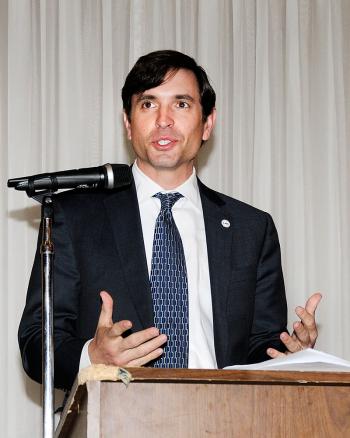
Louisiana Association of Business and Industry President Stephen Waguespack spoke to St. Mary Chamber of Commerce members Wednesday.
(The Daily Review Photo by Jean L. McCorkle)
LABI chief: How does state avoid boom, bust cycle?
Louisiana is on the brink of a booming economic cycle, but will it be followed by yet another bust, or will the state learn how to maintain “cruise control” growth, Louisiana Association of Business and Industry President Stephen Waguespack asked.
Waguespack spoke to St. Mary Chamber of Commerce members Wednesday at the Petroleum Club of Morgan City.
“The challenge we face as a state is we’ve been at this point before,” he said. “We’ve had good runs and we’ve had bad runs. And the question we need to ask ourselves ‘are we going on that same cycle again?’”
In the 1970s, Louisiana outgrew the nation by 15 percent, he said.
“We were blowin’ and goin’. Everyone was making money. The state was doing well. The good times were never going to end,” Waguespack said.
Then, between 1978 and 1983, “the unemployment rate doubled. Investments dried up. A lot of stores went out of business. A lot of businesses left town. A lot of families had to make the choice in the 1980s to leave for jobs,” he said.
The challenge, he said, is not to walk into the same predicament again.
Other southern states maintain sustainable growth, though they go through ups and downs, he said, so Louisiana should be able to accomplish the same feat.
Waguespack said a survey of LABI membership showed 80 percent of members are optimistic about their companies for 2014, much higher than the last few years. Nearly half said they’d like to increase their employment, while 96 percent said they are going to maintain or increase employment numbers.
Meanwhile, economists predict 2 million jobs in 2015, a record in the state’s history, he said.
“The reality is, we’re competing in a global economy. It’s not necessarily town versus town or region versus region anymore. It’s us against the world … the recession has hit every state hard for the last several years, and we’re starting to see some of that peel back. The capital investment that has been sitting on the side for the last couple years is starting to get spent. The states that get out front and show that they’re the best environments to invest, those are the states that are going to get market share as we come out of the national recession,” Waguespack said.
To do that, LABI is focusing on several factors, two of those being workforce development and lawsuit reform, he said.
Employers are worried about the basic education new members of the workforce are graduating with, technical skills, soft skills like professionalism and computer skills and the ability of new hires to pass a drug test, he said.
Some 80 percent of company managers require critical thinking skills for 21st century jobs and report that on-the-job training for up to two years is sometimes necessary, he said.
Waguespack said LABI supports Common Core State Standards because it teaches those critical thinking skills. However, he said that issues with privacy, a federal curriculum and content may need to be addressed, but he thinks the state should “make sure it doesn’t throw out the baby with the bathwater.”
Meanwhile, lawsuit reform is necessary, Waguespack said, because the hostile lawsuit environment in the state winds up costing everyone from businesses to consumers.
Insurance rates are highest in Louisiana, for example, because of the high number of suits versus insurance policies, causing not only rates to jump, but also costs for businesses to rise. When a company looks at the pros and cons of investing in Louisiana, many things are appealing until the lawyers look into it and inform their clients that it is not a safe bet legally, Waguespack, himself a lawyer, said.
One way to arrest this problem is to lower the $50,000 jury trial threshold, that point at which a plaintiff or defendant may request a jury of his peers in a civil trial. Louisiana is the “outlier” among states that have such a threshold. Most, however, have no such threshold, he said.
Waguespack also noted that LABI intends to play defense on the minimum wage increase President Barak Obama called for in his State of the Union address. Instead, he said, “a healthy market inflates wages,” naturally.
- Log in to post comments
